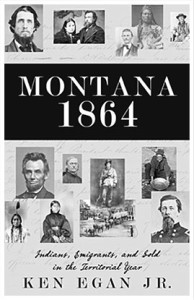About the Book (scroll down for an excerpt and Table of Contents)
 Montana 1864: Indians, Emigrants, and Gold provides a month-by-month account of Montana’s creation at the height of the American Civil War.
Montana 1864: Indians, Emigrants, and Gold provides a month-by-month account of Montana’s creation at the height of the American Civil War.
Beginning with the vigilante hangings in Bannack and Virginia City and ending with the first appearance of Calamity Jane in the new territory, this book invites readers to time travel to a historical moment so seemingly distant yet so important for our lives today.
Meet Henry Plummer, Granville and Awbonnie Stuart, Pretty Shield, Crazy Horse, James and Pamelia Fergus, John Owen, Mary Ronan, and, above all, the many Indian nations that claimed this place as home long before the emigrants arrived.
Montana 1864 reveals the lives of indigenous peoples through excerpts from memoirs, stories passed down through generations, and the words of contemporary Indian writers and remembrancers.
The reader experiences the clash of values as restless, acquisitive people come into contact with peoples long settled in the place now called “Montana.”
The reader also feels how the Civil War was lived in the naming of towns, battles over the original laws of the territory, and street fights in Fort Benton. This legacy of uncivil conflict will delay Montana’s statehood for 25 years.
Perfect for book clubs and classrooms, Montana 1864 makes history accessible and even fun while raising important questions about how this state came to be. We are living the legacy of that fateful year.
Book Excerpt
CALAMITY HAS ARRIVED IN MONTANA BY DECEMBER 31, 1864. A gambler, his prostitute wife, and their six children land in Nevada City after an arduous five-month journey from Iowa. When the pickings prove slim, the children, the oldest named Martha Jane, not to be confused with Mrs. Vail of Sun River Indian Farm, are forced to beg for food in Virginia City: “Three little girls, who state their names to be Canary, appeared at the door of Mr. Fergus, on Idaho street, soliciting charity,” reports the Montana Post. The children have turned to none other than James Fergus, he of the volcanic temper tantrum in August, who serves as a caretaker of the poor in the new town. Fortunately, “Mrs. Fergus, Mrs. Castner and Mrs. Moon kindly provided them with food and some clothing.” The children then return to Nevada City, “where they have existed for some time.” For the parents the reporter spares little sympathy, describing them as “inhuman brutes who have deserted their poor, unfortunate children,” showing a “most flagrant and wanton instance of unnatural conduct on the part of parents to their children.” Read more

